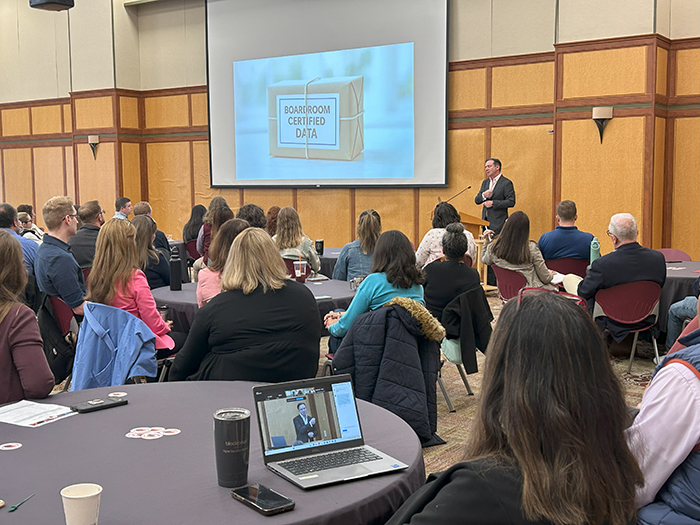Dickinson Symposium Sparks Dialogue on Responsible AI Use, Future of Tech

During one of the day's nearly 20 sessions, Eren Bilen, assistant professor of data analytics, presents research exploring how critical thinking impacts human-AI collaborations.
Daylong event explores teaching, learning, leading with AI
by MaryAlice Bitts-Jackson
Are you an AI skeptic or AI champion? Or perhaps, like most of us, you are somewhere in between. Whatever your views and whatever your experience level with AI, there was something for you to learn and consider during Dickinson’s AI Symposium. Held April 14, the daylong symposium offered opportunities for students, faculty, staff, alumni and friends of the college to join together to learn about and share ways to engage with this transformative technology effectively and responsibly as a community.
“What a terrific venture this symposium is for Dickinson,” said President John E. Jones III ’77, P’11, noting that Dickinson is “leaning in to” AI as a means of augmenting or enhancing experiential teaching and learning. “It is quintessentially what Dickinson is about and should be about, at a time when everything is moving at lightning speed.”
The symposium included presentations on ways that AI is being used at Dickinson, the societal and ethical implications of AI use and student and alumni views of AI. Two keynote speakers addressed the ways we think about and use AI at Dickinson and beyond, and hands-on workshops offered opportunities to practice new and developing AI skills, such as prompt engineering, deep research and AI-generated art.
In-person and virtual registrations for individual events totaled more than 550. “It was energizing to see so many people excited to learn and engage in the exchange of ideas,” said James D’Annibale, director of academic technology and a member of Dickinson’s Presidential Working Group on AI. “An added bonus was that it gave our students a look into what professional conferences are like for their future careers.”
Keynotes, lectures and interactive sessions

"I can't think of a more opportune moment, a better time or a better institution to have this event," said Mike Capone '88, during his keynote address.
Mike Capone ’88, CEO of Qlik, the opening keynote speaker, discussed ethical considerations related to AI and the need for implementation, high-quality data and human oversight. The following day, he hosted more than two dozen students at Qlik, where they met with leadership and learned more about the company and its work. The afternoon keynote speaker, Seth Hain, senior vice president for research and development at Epic, provided insights on AI's role in health care.
Students also participated in the symposium as presenters. Anna Choudary '25 (psychology), Christina DiGiorgio '27 (psychology), Abigail Foster '26 (neuroscience, psychology) and Kaitlyn Meneely '25 (law & policy, psychology) joined Adjunct Professor Howard Rosen to explain how they’re sharpening forensic-evaluation skills by “interviewing” and evaluating characters from the HBO show The Sopranos through ChatGPT chats.
Hemanth Kapa ’27 (neuroscience, computer science) shared findings from a campus survey focusing on how students use AI tools to brainstorm, summarize, edit or debug code and how instructor policies influence behavior. He reported that when faculty clearly allow and guide AI use, students are more open, reflective and responsible in how they engage with these tools.
“The symposium felt like a powerful space to open these conversations. It wasn’t just about presenting findings, but it was about bringing students, faculty and staff together to reflect, question and collaborate,” Kapa said. “I’m grateful to have contributed to a collective effort to think more deeply about what inclusive, and forward-thinking education can look like in the age of AI.”
Jennifer Georgino ’77, a former corporate paralegal and in-house corporate legal manager who’s concerned about regulations and privacy issues, attended four sessions remotely from her home in Atlanta. Having served on the Technology Association of Georgia’s digital-health board and as a physician recruiter, she was particularly interested in Hain’s keynote address. She also tuned in to Capone’s keynote, MaryAlice Bitts-Jackson’s presentation on public views of AI and Professor of International Business & Management Steve Erfle’s livestream on electronic string art.
“The symposium was a good event and great idea,” she said. “The technology is moving so fast, and it’s important to stay informed.”
The Dickinson AI Symposium was sponsored by the Burgess Institute for the Global Economy, the Center for Career Development and the Department of College Advancement.
TAKE THE NEXT STEPS
Published April 17, 2025